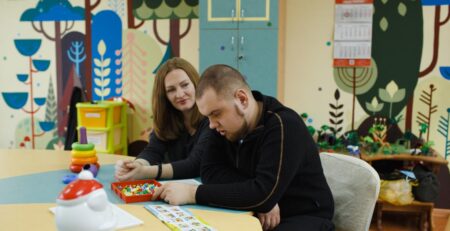
Empowering Adults with Autism: Strategies for Achieving Independence
Armita Hosseini
M.Ed., M.A., C. Psych., Assoc
Armita Hosseini is a registered psychological associate with the College of Psychologists of Ontario. She received her Master of Education in Counselling Psychology from Western University (2013) and Masters of Clinical-Developmental Psychology at York University (2015).
Autism is a neurodevelopmental disorder that affects individuals of all ages, including adults. While much attention is often given to supporting children with autism, the needs and challenges faced by adults with autism are often overlooked. Empowering adults with autism is essential to their overall well-being and quality of life.
With the right strategies and support, adults with autism can achieve a sense of independence and lead fulfilling lives. This blog will explore various strategies and resources for empowering adults with autism, including employment opportunities, social skills development, and community integration. Whether you are an individual with autism, a caregiver, or a professional in the field, this blog aims to provide valuable insights and tools for promoting independence in adults with autism.
Understanding the challenges faced by adults with autism
To effectively empower adults with autism, it is crucial to have a deep understanding of the challenges they face on a daily basis. It is important to recognize that autism is a spectrum disorder, and each individual’s experiences and needs may vary greatly.
One common challenge faced by adults with autism is social interaction and communication difficulties. Many individuals struggle with understanding social cues, maintaining eye contact, and engaging in conversations. These challenges can make it challenging to build and maintain meaningful relationships, both personally and professionally.
Another significant challenge is finding suitable employment opportunities. Adults with autism possess unique talents and abilities, yet they often face barriers when it comes to securing and maintaining employment. It is crucial to address these barriers through inclusive hiring practices, job training programs, and workplace accommodations.
Furthermore, adults with autism may struggle with adapting to changes in routines and transitioning from one environment to another. These difficulties can be particularly evident when it comes to living independently, accessing community resources, and participating in social activities.
By understanding these challenges and addressing them with targeted strategies and support, we can help adults with autism overcome obstacles and achieve a greater sense of independence. In the following sections, we will discuss specific strategies and resources that can empower adults with autism to navigate these challenges and thrive in various aspects of their lives. Stay tuned.
Creating a supportive and inclusive environment
Creating a supportive and inclusive environment is essential when empowering adults with autism to achieve independence. This includes fostering an environment that respects and values their unique abilities and challenges.
One way to create a supportive environment is by promoting awareness and understanding of autism among the broader community. Educating coworkers, family members, and friends about the characteristics of autism can lead to increased acceptance and inclusion.
Additionally, it is important to provide ongoing support and accommodations in the workplace. This can include implementing sensory-friendly workspaces, providing clear communication and instructions, and offering job coaching or mentoring programs.
In the community, creating inclusive spaces and activities can also help adults with autism feel more comfortable and engaged. This can involve working with local organizations to develop autism-friendly events and programs, such as sensory-friendly movie screenings or recreation activities.
By creating a supportive and inclusive environment, we can help adults with autism thrive in both their personal and professional lives, enabling them to achieve independence and reach their full potential.
Completing an assessment can be an important step to move forward
Developing practical life skills
Developing practical life skills is a crucial aspect of empowering adults with autism and helping them achieve independence. These skills are essential for everyday tasks, such as managing personal finances, cooking meals, and maintaining a clean living environment.
One effective strategy for teaching practical life skills is through structured and individualized instruction. Breaking down tasks into smaller steps and providing visual support can greatly assist individuals with autism in learning and mastering these skills. This can be done through the use of visual schedules, task checklists, and hands-on demonstrations.
It is also important to provide opportunities for practice and generalization of skills. This can be achieved by incorporating these skills into daily routines and encouraging individuals to independently apply them in different contexts.
Additionally, seeking community resources and support programs can be beneficial for further skill development. These programs may offer vocational training, financial literacy workshops, and social interaction opportunities.
By equipping adults with autism with practical life skills, we empower them to navigate the challenges of independent living successfully and enhance their overall quality of life.
Providing vocational training and job opportunities
In addition to developing practical life skills, vocational training and job opportunities play a crucial role in empowering adults with autism to achieve independence. Finding meaningful employment not only provides individuals with a sense of purpose and fulfillment but also allows them to contribute to society and build financial stability.
When it comes to vocational training, it is important to focus on assessing an individual’s strengths and interests. This can help identify suitable career paths and tailor the training program accordingly. Many organizations now offer specialized vocational programs specifically designed for individuals with autism, providing them with the necessary job skills and professional development.
Furthermore, creating inclusive workplaces that embrace diversity and accommodate different learning styles and communication needs is paramount. Employers can take steps to foster an inclusive environment by providing autism awareness and sensitivity training to their staff, implementing reasonable workplace accommodations, and promoting a culture of acceptance and understanding.
Job coaches and mentors can also provide valuable support during the employment process. These professionals can assist with job searching, resume building, interview preparation, and on-the-job training. With the right support and opportunities, adults with autism can thrive in the workplace and achieve a greater level of independence.
By focusing on vocational training and job opportunities, we can empower adults with autism to unlock their full potential and lead fulfilling, independent lives.
Encouraging independent living
In addition to vocational training and job opportunities, encouraging independent living is another essential strategy in empowering adults with autism to achieve independence. Independent living refers to an individual’s ability to take care of oneself and manage daily life tasks without constant supervision or support.
One key aspect of promoting independent living is providing individuals with autism the necessary life skills to navigate various aspects of daily life. These skills may include personal hygiene, cooking, cleaning, managing personal finances, and transportation. Teaching individuals these skills not only promotes independence but also enhances their self-confidence and self-sufficiency.
Supporting independent living can also involve creating inclusive housing options. This can include developing specialized living communities that cater to the specific needs of individuals with autism. These communities can offer a supportive environment with essential services and resources to help adults with autism live independently while still having access to necessary support when needed.
Additionally, establishing mentorship programs can be instrumental in fostering independent living. Mentors can provide guidance and support in areas such as decision-making, problem-solving, and navigating social situations. Having a mentor can offer adults with autism a consistent source of support and encouragement as they navigate the challenges and opportunities that come with independent living.
By encouraging independent living, we can empower adults with autism to lead autonomous and meaningful lives. This not only improves their overall quality of life but also promotes inclusion and a sense of belonging within society. Together with vocational training and job opportunities, fostering independent living is a vital step towards empowering adults with autism to achieve their full potential.
Completing an assessment can be an important step to move forward
The importance of ongoing support and advocacy
While teaching life skills, providing inclusive housing options, and offering mentorship programs are crucial steps in empowering adults with autism to achieve independence, ongoing support and advocacy are equally important.
Support systems play a vital role in assisting individuals with autism as they navigate the challenges of independent living. This can include access to professional services such as therapists, social workers, and life coaches who can provide guidance and assistance for specific needs. Additionally, support groups and networks can offer a sense of community and understanding, allowing individuals to connect with others facing similar experiences.
Advocacy is also essential in ensuring that adults with autism receive the necessary resources, accommodations, and opportunities to thrive independently. This can involve advocating for policy changes that promote inclusivity and equality, as well as working towards reducing stigma and increasing awareness about autism in society.
By providing ongoing support and advocating for the needs of adults with autism, we can create a society that values and supports their independence. It is through a combination of empowerment, education, and compassionate advocacy that we can truly empower adults with autism to live fulfilling lives on their terms.
Conclusion
In conclusion, empowering adults with autism to achieve independence requires a comprehensive approach that encompasses various strategies and support systems. By focusing on teaching life skills, providing inclusive housing options, and offering mentorship programs, we can equip individuals with the necessary tools to navigate the challenges of independent living.
However, these efforts must be accompanied by ongoing support and advocacy. Access to professional services, support groups, and networks are crucial in helping individuals with autism thrive independently and feel connected to a community of understanding individuals. Advocacy is equally important in ensuring that adults with autism receive the resources and accommodations they need to live fulfilling lives.
By embracing empowerment, education, and compassionate advocacy, we can break down barriers, promote inclusivity, and create a society that values and supports the independence of adults with autism. Together, let us work towards a future where individuals on the autism spectrum can achieve their fullest potential and lead lives of independence and self-determination.



